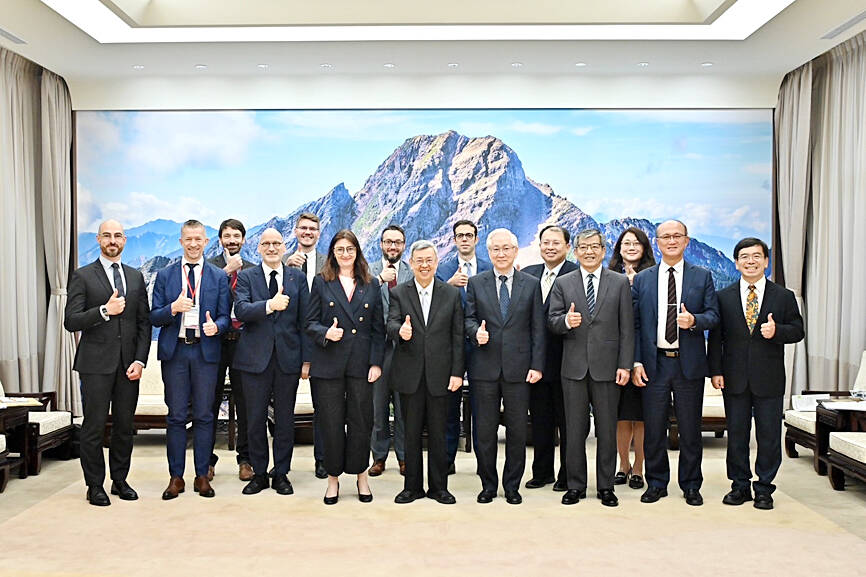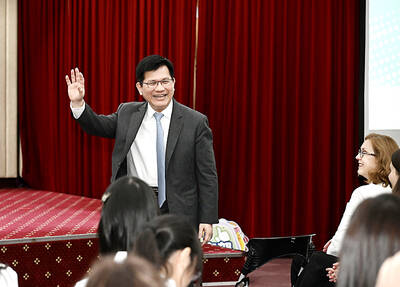The National Science and Technology Council (NSTC) yesterday released the latest artificial intelligence (AI) language model in traditional Chinese embedded with Taiwanese cultural values.
The council launched the Trustworthy AI Dialogue Engine (TAIDE) program in April last year to develop and train traditional Chinese-language models based on LLaMA, the open-source AI language model released by Meta.
The program aims to tackle the information bias that is often present in international large-scale language models and take Taiwanese culture and values into consideration, it said.

Photo: Reuters
Llama 3-TAIDE-LX-8B-Chat-Alpha1, released yesterday, is the latest large language model in traditional Chinese. It was trained based on Meta’s Llama-3-8B model and has completed basic testing, the council said.
Following Meta’s release of Llama 3 on April 19, the TAIDE team immediately started developing the new model based on the data it had collected over the past 12 months, it said.
In line with its development strategy of making quick and fast upgrades, the team released the new model after four days of training and basic testing, it said.

Photo courtesy of the Exectuive Yuan
NSTC Minister Wu Tsung-tsong (吳政忠) said it is impressive that the team was able to complete the training in only four days and released a commercial version for use by academia, research institutes and industry.
The team would make adjustments on a rolling basis according to opinions collected from all sectors to continue improving the model, the council said.
Since the council released TAIDE-LX-7B, which was based on Meta’s Llama 2, on April 15, many installation and user guides have been shared on social media platforms, it said.
In addition, more than 10 manufacturers and several academic units, research teams and public agencies have begun to apply the model in system development, it said.
In other developments, Taiwan and France are holding a two-day scientific research conference in Taipei that ends today, the council said, adding that it is based on the science and technology cooperation agreement that the two sides signed in November last year.
Under the agreement, Taipei and Paris are to cooperate in six major fields — semiconductors and quantum technologies, biomedicine, green energy and carbon reduction, artificial intelligence security, space and ocean, it said.
Claire Giry, director-general of research and innovation at the French Ministry of Higher Education, Research and Innovation, and French Representative to Taiwan Franck Paris attended the opening ceremony of the conference yesterday, it said.
France is one of Taiwan’s closest Europeans partners in scientific and technological cooperation, Wu said, adding that the two sides have signed a number of cooperation agreements and established a comprehensive scientific research subsidy mechanism.
The French delegation includes representatives from the French National Centre for Scientific Research, the French National Research Agency and the French Alternative Energies and Atomic Energy Commission, as well as experts in the six fields of cooperation, it said.

FIREPOWER: On top of the torpedoes, the military would procure Kestrel II anti-tank weapons systems to replace aging license-produced M72 LAW launchers Taiwan is to receive US-made Mark 48 torpedoes and training simulators over the next three years, following delays that hampered the navy’s operational readiness, the Ministry of National Defense’s latest budget proposal showed. The navy next year would acquire four training simulator systems for the torpedoes and take receipt of 14 torpedoes in 2027 and 10 torpedoes in 2028, the ministry said in its budget for the next fiscal year. The torpedoes would almost certainly be utilized in the navy’s two upgraded Chien Lung-class submarines and the indigenously developed Hai Kun, should the attack sub successfully reach operational status. US President Donald Trump

Taiwan Semiconductor Manufacturing Co (TSMC, 台積電) is expected to start construction of its 1.4-nanometer chip manufacturing facilities at the Central Taiwan Science Park (CTSP, 中部科學園區) as early as October, the Chinese-language Liberty Times (the Taipei Times’ sister newspaper) reported yesterday, citing the park administration. TSMC acquired land for the second phase of the park’s expansion in Taichung in June. Large cement, construction and facility engineering companies in central Taiwan have reportedly been receiving bids for TSMC-related projects, the report said. Supply-chain firms estimated that the business opportunities for engineering, equipment and materials supply, and back-end packaging and testing could reach as high as

ALL QUIET: The Philippine foreign secretary told senators she would not respond to questions about whether Lin Chia-lung was in the country The Ministry of Foreign Affairs on Wednesday confirmed that a business delegation is visiting the Philippines, but declined to say whether Minister of Foreign Affairs Lin Chia-lung (林佳龍) is part of the group, as Philippine lawmakers raised questions over Lin’s reported visit. The group is being led by Deputy Minister of Agriculture Huang Chao-chin (黃昭欽), Chinese International Economic Cooperation Association (CIECA) chairman Joseph Lyu (呂桔誠) and US-Taiwan Business Council (USTBC) vice president Lotta Danielsson, the ministry said in a statement. However, sources speaking on condition of anonymity said that Lin is leading the delegation of 70 people. Filinvest New Clark City Innovation Park

DEFENSIVE EDGE: The liaison officer would work with Taiwan on drones and military applications for other civilian-developed technologies, a source said A Pentagon unit tasked with facilitating the US military’s adoption of new technology is soon to deploy officials to dozens of friendly nations, including Taiwan, the Financial Times reported yesterday. The US Department of Defense’s Defense Innovation Unit (DIU) is to send a representative to collaborate with Taiwan on drones and military applications from the semiconductor industry by the end of the year, the British daily reported, citing three sources familiar with the matter. “Drones will certainly be a focus, but they will also be looking at connecting to the broader civilian and dual-use ecosystem, including the tech sector,” one source was